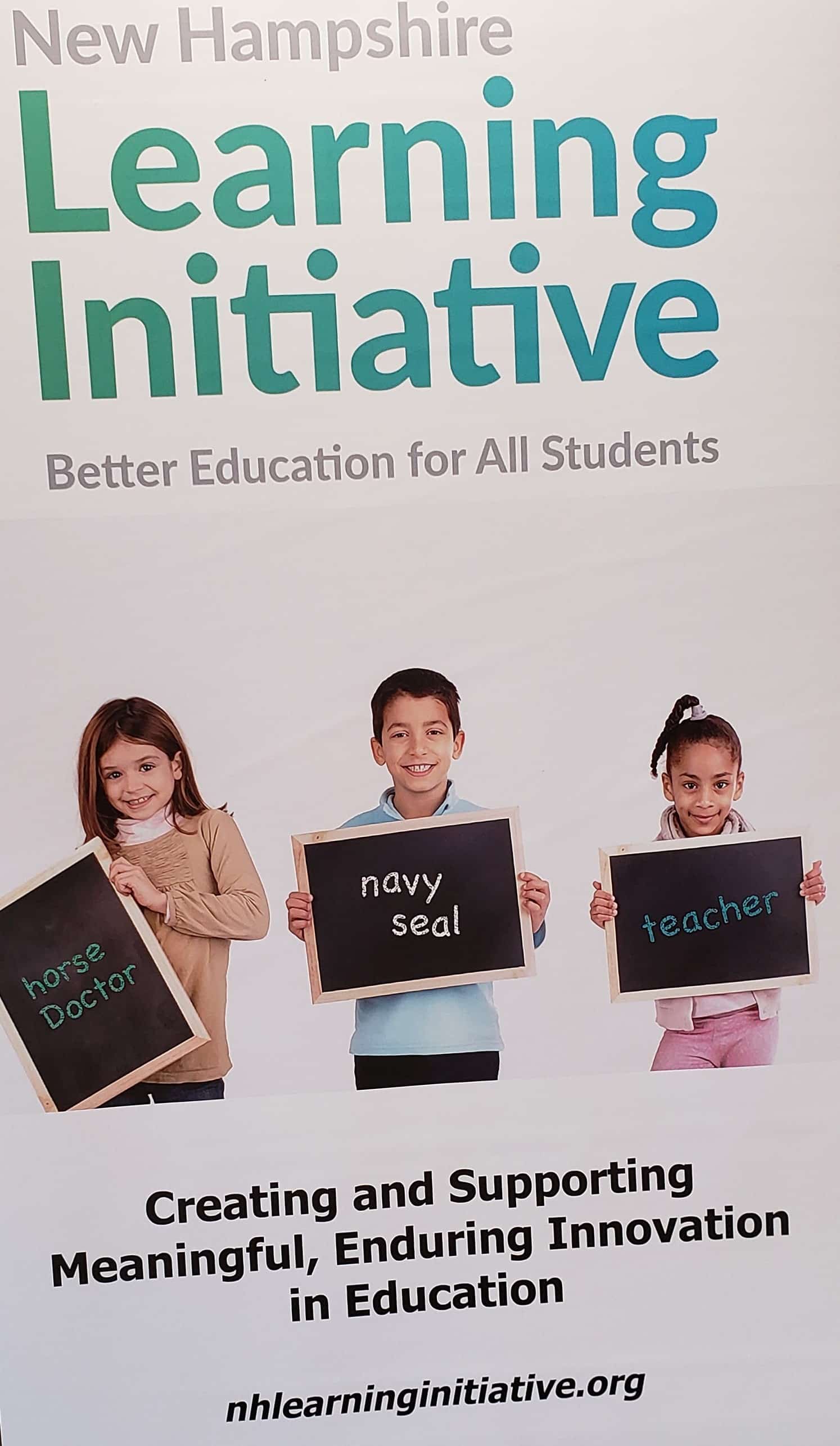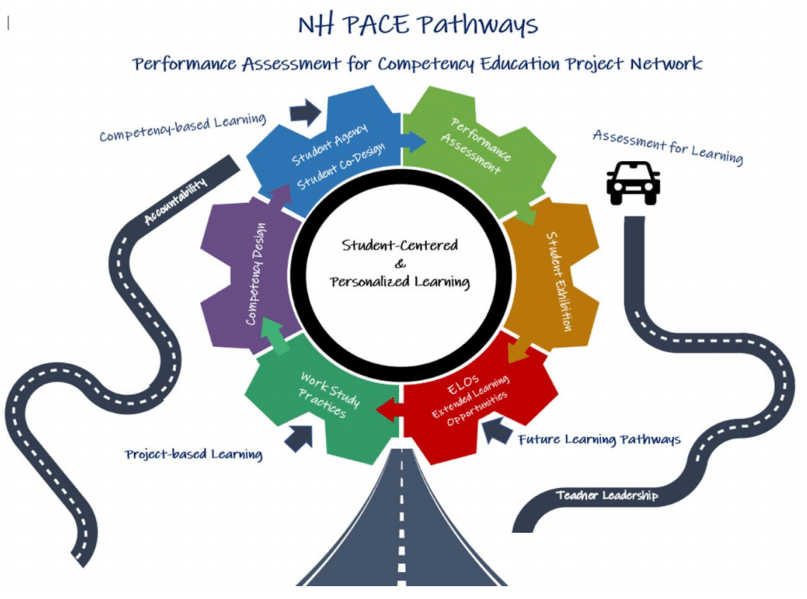The New Hampshire Learning Initiative: A Model for Catalyzing State-Wide Transformation
CompetencyWorks Blog
 The New Hampshire Learning Initiative serves as a catalyst to oversee and support scaling of New Hampshire’s work toward an integrated, competency-based education system. I recently attended their annual Powerful Learning Conference, where hundreds of school and district personnel attended keynotes, sessions, workshops, and daily “team time” (with school teams or groups of individual attendees) to advance their practices related to competency-based education.
The New Hampshire Learning Initiative serves as a catalyst to oversee and support scaling of New Hampshire’s work toward an integrated, competency-based education system. I recently attended their annual Powerful Learning Conference, where hundreds of school and district personnel attended keynotes, sessions, workshops, and daily “team time” (with school teams or groups of individual attendees) to advance their practices related to competency-based education.
The annual conference is one of many initiatives that NHLI provides throughout the year to support transformation at the school, district, and state levels. Their work is closely tied to New Hampshire’s Performance Assessment for Competency Education (PACE) Pathways Network. PACE provides an opportunity for districts to administer locally developed performance assessments that support deeper learning. These assessments are designed to be a meaningful and positive learning experience for students—a key component of competency-based education. The PACE system is approved by the U.S. Department of Education through its Innovative Assessment Pilot program, section 1204 of the Every Student Succeeds Act.
NHLI is explicit that both their work and PACE are not just about assessment and accountability, however. As shown in the figure below, PACE also emphasizes project-based learning, teacher leadership, competency design, student agency, student exhibitions, extended learning opportunities (NH’s term for out-of-school learning activities), and work study practices (NH’s term for lifelong learning skills such as collaboration and self-direction).

NHLI leads a diverse set of initiatives that provide a series of “on-ramps” to deeper implementation of each of these elements of quality competency-based education. Just as CBE promotes meeting students where they are, NHLI’s on-ramps meet educators and administrators where they are. And sometimes “where they are” includes being unclear on what performance assessments are, fearful of starting because of obstacles to full implementation, or concerned that not all teachers or school committee members are on-board.
The different on-ramps enable any school to become part of the PACE network regardless of where they are. This fits well with New Hampshire’s status as a national leader and innovator in competency-based education. Three of NHLI’s many initiatives are described below, and could inform efforts in other states seeking to deepen their competency-based practices.
The Assessment for Learning Project works with teachers to develop a personalized environment that promotes deeper learning and students as active agents. The types of learning experiences they promote integrate the New Hampshire work study practices (collaboration, communication, creativity, and self-direction) as well as formative assessments, end-of-unit exhibitions (performance assessments), and student-led parent conferences.
For school leaders, NHLI is a local collaborator with School ReTool, a professional learning opportunity to create a school culture of innovation using “small, scrappy experiments called ‘hacks’ … an approach to change in schools using quick yet powerful experiments and a willingness to try, fail and learn, all in an effort to rethink how education is delivered.” A second purpose is for school leaders to help educators bring this “hack mindset” into the classroom.
NHLI’s Framing the Message program makes it clear that they have considered many angles on the challenges of implementing competency-based education. It’s a day-long workshop and online module that helps school leaders develop skills for communicating with parents and the school community, such as through local newspapers, radio, blogs, and social media. This offering was in part a response to many leaders having their innovations attacked on social media and not knowing how to pre-empt the attacks or respond effectively once they happened.
NHLI also has partnerships for a wide range of policy, practice, and research projects with Jobs for the Future, PBL Works, Reaching Higher, the National Education Association, and the New Hampshire Association of School Principals, School Administrators Association, and School Board Association.
With NHLI’s leadership team, it’s not surprising that they are able to bring such depth and insight to their work. Executive Director Ellen Hume Howard was curriculum director for the Sanborn Regional School District and guided the development of the district’s nationally recognized K-12 competency-based learning system. Director of Innovative Projects Jonathan Vander Els was a principal in Sanborn, consults nationally on competency-based education, and co-wrote the book Breaking With Tradition: The Shift to Competency-Based Learning in PLCs at Work. Mariane Gfroerer, NHLI’s Director of PACE and College and Career Readiness, worked for the New Hampshire Department of Education for more than 20 years in roles including State Director of PACE and leadership in developing the state’s Competency-Based Transcript, K-12 Career Development Curriculum Frameworks, and Extended Learning Opportunities implementation.
The New Hampshire Learning Initiative provides the types of diverse supports that are essential for high-quality implementation of competency-based education. They also serve as a model that could inform similar efforts in other districts and states pursuing transformative change.
Learn More:
- Connecting the Dots: Aligning Efforts to Support Teachers and Students in New Hampshire
- Our Quest to Personalize Competency-Based Learning in New Hampshire
- Three Lessons Learned from PACE
- New Hampshire: Building an Integrated Competency-Based System
- From “Shock and Awe” to Systemic Enabling: All Eyes on New Hampshire
Eliot Levine is the Aurora Institute’s Research Director and leads CompetencyWorks.